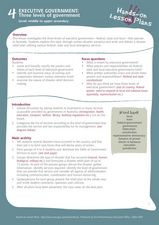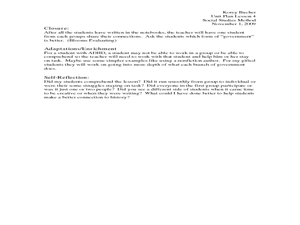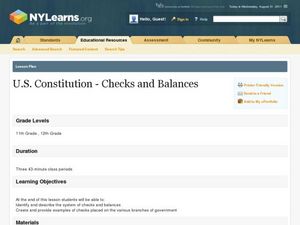Curated OER
The Three Branches of Government
Middle schoolers complete a unit on the three branches of government. They compare/contrast the three branches of government, write a letter or e-mail to an executive in the Federal Government, and develop outlines for historical...
Curated OER
The Three Branches of Government
Students write about working in one branch of government. For this branches of government lesson, students read about the three levels of government using various websites and then work in groups to discuss, illustrate and write about...
Curated OER
Executive Government: Three Levels of Government
Young scholars identify and classify the powers and responsibilities of all three levels of executive government in Australia. In this executive government lesson plan, students discuss the various services that the government in...
Curated OER
Types of Branches
Fourth graders study the three branches of government. In this politics lesson, 4th graders list the three branches of government, understanding what each branch does, and compare and contrast how government is run with how the school is...
Curated OER
Creating a Government
A simulation gives scholars a personal look at what goes into forming a government. Each of them is assigned 1 of 4 tribes which make up Borka, a hypothetical country. The tribe distribution is based on the percentage of people in each....
Curated OER
Three Levels of Government
Students name and broadly classify the powers and duties of each level of executive government in Australia. They identify and examine areas of overlaid and cooperation between various executive levels. Students examine the nature of...
Curated OER
Who's The Boss?
Upper elementary and middle schoolers research and analyze some different types of governments. Democracies, Monarchies, and Dictatorships are some of the types that are looked at. Learners use the Internet to gather information that...
iCivics
Limiting Government
While this lesson includes several nice worksheets to identify and discuss the various limits on government (i.e. a constitution, the rule of law, separation of powers, consent of the governed, etc.), its main value lies in a case study...
iCivics
Step Five: All about Public Policy
Public policy is important to understand because it affects everyone. The resource tells middle schoolers how the government uses policy to accomplish goals in the administration. It includes a reading, true or false worksheet, a...
Curated OER
Lesson 4: The Judiciary: A Brief Introduction to the Courts System
Focusing on the judicial branch of government, the fourth lesson in this series explores the structure of the US courts system. Beginning with an engaging activity based on the short story The Lady or the Tiger, learners go on to examine...
Federal Reserve Bank
Government Spending and Taxes
What types of government programs are designed to improve economic inequity in the United States? Introduce your learners to government programs, such as low-income housing, Social Security, and Medicaid, how they work to improve...
iCivics
Wanted: A Just Right Government
What type of government did American colonists gain and seek after gaining their independence after the Revolutionary War? Here is activity that will guide your young learners through the new nation's progression from the Articles of...
School Improvement in Maryland
Types of Economic Systems
As an introduction to economics, government classes investigate different types of economic systems (traditional, command, market or capitalist, mixed) to determine answers to basic question about how goods are produced.
Council for Economic Education
Government Spending: Why Do We Spend the Way We Do?
Young scholars examine the categories for federal spending using the internet to locate them. They create a list of expenditures noting them as government purchases or transfer payments. They analyze the patterns of spending during the...
Curated OER
U S Constitution--Checks and Balances
Students get an in-depth look at how our checks and balances system helps maintain the separating of powers between the three branches of government. They use current event head lines and insert them into he appropriate space on the...
School Improvement in Maryland
Court Proceedings Civil Cases
What's the difference between civil and criminal law? How do the court proceedings differ in these two types of trials? How do the standards of proof differ? Why do these differences exist? As part of their examination of the US court...
Curated OER
Government Protecting Rights
Students explore tribal sovereignty. For this American Indian lesson, students learn about tribal sovereignty, watch a movie, take notes, and complete a reaction paper.
C-SPAN
Primary and Secondary Sources: Trailblazers in Congress
Trailblazers forge the path into uncharted territory, they establish a precedent for others to follow. Young historians research trailblazers in Congress using primary and secondary sources to profile outliers that changed the face of...
School Improvement in Maryland
Political Systems: Advantages and Disadvantages
Every political system has advantages and disadvantages. To gain an understanding of these differences, groups investigate the political system of another country—oligarchy, monarchy, dictatorship, parliamentary—and prepare a...
Curated OER
Lessons from the Holocaust
Middle schoolers discover what a dictatorship is by examining the holocaust. In this government lesson, students discuss the laws that were enacted for Nazis to take control of Germany, and the types of laws we have put place to prevent...
Curated OER
State of Affairs
Students examine the various roles and duties of state government officials and offices to create an Informative Guide to Our State's Government. They explore the changing relationship between governor and lieutenant governor in New York.
School Improvement in Maryland
Executive Order
After reading information about Executive Order #9066, class members assume the voice of an 18 year-old Japanese-American born in California and placed in an internment camp. Individuals then craft a letter to President Roosevelt...
Curated OER
Perks and Perils
Learners research the life of the first family. In this U.S. Government lesson plan, students take a White House quiz, read an article about the first family and write in their journals about a typical day in their lives versus what a...
Curated OER
What a Relief!
How are disasters addressed by the Federal Government? This New York Times lesson, based on the article "Disaster Aid: The Mix of Mercy and Politics," prompts middle schoolers to discuss the idea of using a disaster declaration as a...

























